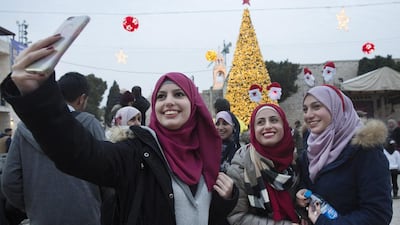BETHLEHEM, WEST BANK // There is little good cheer for businesses around Bethlehem’s Manger Square this Christmas.
“Every year it gets worse,” said Adnan Sobah, standing on the pavement outside his souvenir shop. “There are no tourists, only local people. The tourists are scared to come because of violence in the Middle East.”
With two days to go before Christmas, Manger Square – the site of the 4th-century Church of the Nativity marking the traditional birthplace of Jesus – was largely empty on Friday, with only a sprinkling of tourists, mostly from Arab areas in Israel or from other parts of the West Bank.
Mr Sobah interrupted questions with one of his own: “Won’t you come inside and see my shop? Maybe you’ll be lucky for me.”
Inside, he showed off wares including colourful carpets, small brass candelabras and an olive-wood carving of what appear to be a shepherd and one of the Three Wise Men. But this Nativity scene has a twist – they are blocked by a wall similar to the separation barrier Israel has erected between Bethlehem and Jerusalem.
“The wall makes people scared to come to Bethlehem,” Mr Sobah said. “It’s higher than the Berlin wall.”
Mr Sobah made only US$20 (Dh73) in sales on Thursday and said he would be unable to repay the loans he took to stock his shop for Christmas. “If you want to help me, you can make my Christmas,” he said, still hoping to make a sale.
The story was similar in shops throughout Manger Square, but Bethlehem was not completely devoid of good news. The 219-room Manger Square Hotel was fully booked, said Luna Sahouri, an employee, and doing much better than last Christmas when a wave of Palestinian-Israeli violence shook the area.
“We think Christmas will be bigger this year than last year,” said Fadi Ghattas, spokesman of the Bethlehem municipality.
Among the tourists near Manger Square was Praise Lazarus, a Christian from Nigeria who said she felt safe in Bethlehem and was excited to “join those who believe in Christ to celebrate his birth”.
“The Palestinians that live here are kind and friendly, whether Muslim or Christian,” she said.
Ahmad Aweidah, chief executive of the Palestinian stock exchange, was in Bethlehem to shop for a dinner he is hosting for 25 friends on Christmas evening. Sporting a Santa Claus hat, he said loved to celebrate Christmas even though he was Muslim. “It’s a very special time of year. In Palestine it’s a national holiday, not just for Christians, because Jesus was the first Palestinian,” he said.
But there was little festive cheer inside Christmas House, one of the oldest souvenir shops in Bethlehem. The owner, Nabil Giacamin, said his brother no longer visited from Dubai to help out at Christmas.
“I don’t need him because there is no business,” he said.
Mr Giacamin blamed the authorities for not doing enough to make Manger Square a friendly and lively place. He was particularly upset about the metal barricades set up in parts of the square.
“They are scary. They are not a nice view of Bethlehem. They are giving people the impression that it’s dangerous,” he said. “You need security but there is another way of doing it. You can check people when they come in and keep the square itself free for everyone to move around.”
He was also angry at tour guides, whom he accused of misleading tourists that it was not safe to walk around freely. This was so that the visitors would stay close to the shops from which the guides get a commission on sales, he said.
Another complaint among souvenir sellers was the way cheap imports from China had driven out locally crafted goods in recent years. Local businessmen estimated that about half of the goods in Bethlehem souvenir shops now came from China, including nativity scenes, replicas of the Dome of the Rock mosque in Jerusalem and magnets showing the Church of the Nativity.
“It affects us because people want the cheap stuff and olive-wood carvings are by hand, they’re costly,” Mr Giacamin said.
He owns a souvenir factory near his shop that employed 25 workers in 2010, but competition from China has driven the staff down to seven. “I can’t keep feeding them,” he said.
Pilgrims buying rosary beads in Mr Giacamin’s shop can choose Bethlehem olive-wood ones for $10 dollars or Chinese ones from poorer quality wood for $2.50. Nativity scenes made from olive wood cost $150 and Chinese ones made from resin $35.
“I sell three times more of the resin ones,” he said.
foreign.desk@thenational.ae

